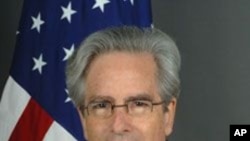Speaking to the Americas Conference, U.S. Assistant Secretary of State for Western Hemisphere Affairs Arturo Valenzuela said the United States is pursuing a new approach of dynamic engagement in Latin America. This policy seeks to advance U.S. interests in partnership with Latin America as a whole, while recognizing the value of accommodating diverse needs and interests.
Promoting social and economic opportunities in Latin America is a key component of U.S. policy. Already, trade with the region is very robust. In 2009, total U.S. merchandise trade with Latin America reached $524 billion. More than 40 percent of Latin American exports flowed to the U.S., making the U.S. the region's single largest export destination – and the Western Hemisphere, including Canada absorbs 43 percent of U.S. exports.
The United States has long been a leader in promoting open markets around the hemisphere, said Assistant Secretary Valenzuela, and this will continue. President Barack Obama is committed to moving forward with both the Panama and Colombia Free Trade Agreements once remaining issues have been resolved.
In a competitive and globalized economy, expanding opportunity, said Assistant Secretary Valenzuela, "requires 2 things: investment in infrastructure and investment in people." Without adequate roads, bridges, port facilities, power plants, and airports, goods can't get to market at home or overseas. Without adequate financial infrastructure, large and small enterprises cannot get the loans they need to conduct business. And without training and education for all, people are left behind.
It is critical for Latin America to do a better job of educating all of its citizens and to lay the foundation for productive, thriving formal economies, said Assistant Secretary Valenzuela, otherwise it cannot reasonably expect to compete with other regions of the world. This is why it is essential for governments to implement reforms and put into place fairer, simpler, and more transparent tax regimes. This means the region must address the epidemic of tax evasion – which currently exceeds 50 percent by some estimates.
The U.S. is also working with regional partners to expand social mobility and justice, create broader foundations for economic growth, and ensure that the benefits of growth and trade are distributed more equitably. This is the new vision for U.S. policy in Latin America -– one that is respectful, responsive and realistic.
This policy seeks to advance U.S. interests in partnership with Latin America as a whole, while recognizing the value of accommodating diverse needs and interests.

















